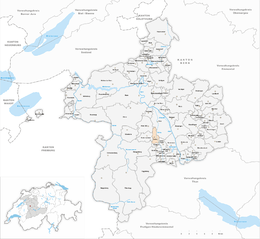Toffen
| Toffen | ||
|---|---|---|
 |
||
|
||
| Coordinates: 46°52′N 7°30′E / 46.867°N 7.500°ECoordinates: 46°52′N 7°30′E / 46.867°N 7.500°E | ||
| Country | Switzerland | |
| Canton | Bern | |
| District | Bern-Mittelland | |
| Government | ||
| • Mayor | Ruth Rohr | |
| Area | ||
| • Total | 4.9 km2 (1.9 sq mi) | |
| Elevation | 527 m (1,729 ft) | |
| Population (Dec 2015) | ||
| • Total | 2,527 | |
| • Density | 520/km2 (1,300/sq mi) | |
| Postal code | 3125 | |
| SFOS number | 0884 | |
| Surrounded by | Belp, Belpberg, Gelterfingen, Kaufdorf, Niedermuhlern, Rüeggisberg, Wald | |
| Website |
www SFSO statistics |
|
Toffen is a municipality in the Bern-Mittelland administrative district in the canton of Bern in Switzerland. It lies approximately 10 km south of the city of Bern.
The palace situated there, Toffen Castle, is a heritage site of national significance.
Toffen is first mentioned in 1148 as Toffen.
The oldest trace of a settlement in the area is a Bronze Age grave which was discovered near the castle. During the Roman era there was a manor house near Bodenacker. In addition to the house, Roman coins and ceramics have been found around the municipality. The Romans also quarried Tuff stone from the area and the Latin word for Tuff, tofus probably becoming Toffen. By the 13th century it was part of the Herrschaft of the Freiherr von Belp-Montenach. Around 1300 the village was acquired by another noble family and for several centuries it was owned by a number of different noble families. By the mid-14th century Bern ruled over the village and the owners now included Bernese patrician families.
The castle was first mentioned in 1306 and was the center of the local Herrschaft. In 1507 Bartholomew May expanded and renovated it into a late Gothic country manor house. In 1628 Loy Knoblauch redesigned the entire interior. In 1671-73 Johann Georg renovated the castle into a Baroque manor. Around 1750 Georg Samuel von Werdt expanded and renovated the castle again. Following the 1798 French invasion, and the creation of the Helvetic Republic the owners of the castle lost their medieval rights to rule over, judge and punish the villagers. However, they retained ownership of the castle and it remained in private hands.
...
Wikipedia




